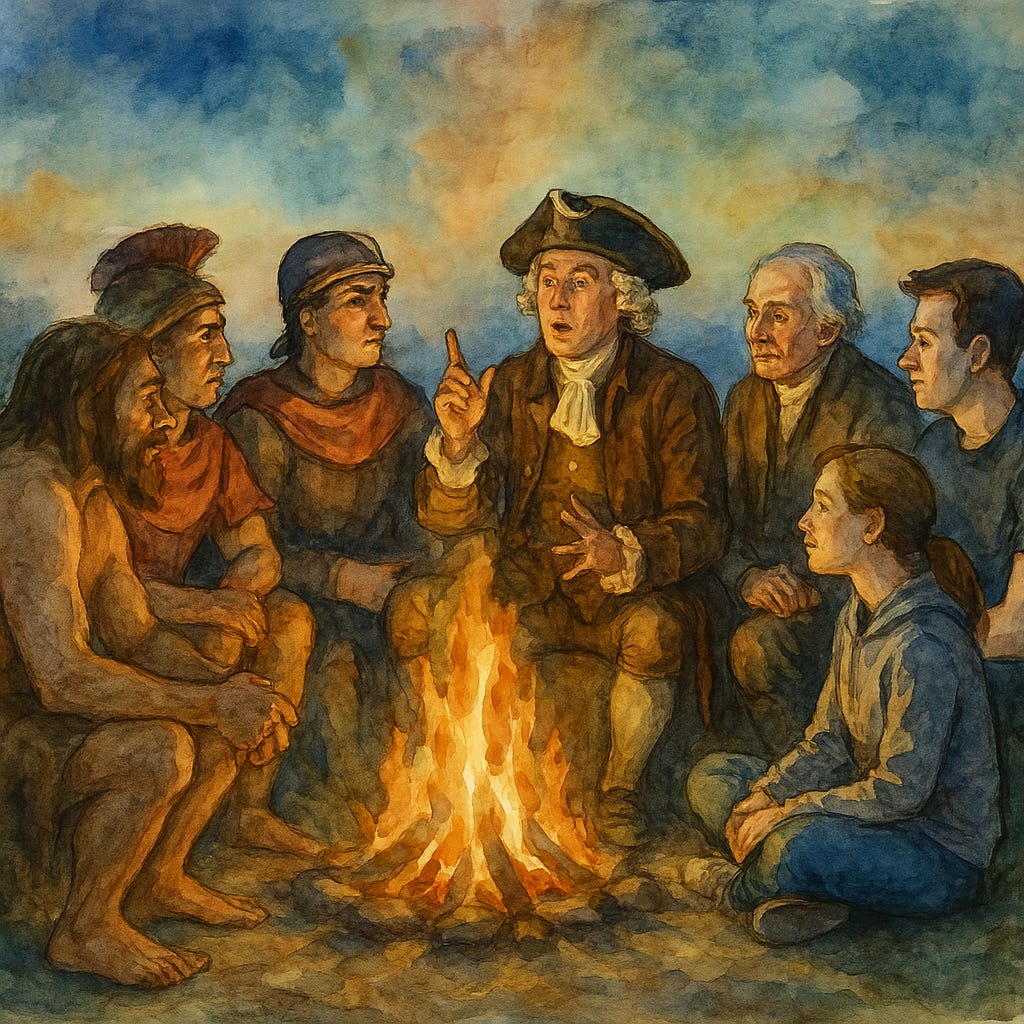Mind Candy is a newsletter on practical philosophy and human flourishment—aka how to live “the good life.” Each month we tackle a new theme.
Introduction to Monthly Theme
“Stories teach us what is important about life, why we are here and how it is best to behave, and that inside us we have access to treasure, in memories and observations, in imagination.”
Story is one of the first inventions humans ever made. And it is also the greatest.
Nothing compares to the power of story. It is in fact through story, through the spreading and sharing of ideas, that everything around us exists.
Ultimately, at the end of the day, the most powerful thing in the world is an idea, and that idea is spread through story.
Every culture has stories and has been telling them since the dawn of tribes. These stories build beliefs, teach us who we are, provide us the values we cherish and want to live by, and remind us what we’re capable of.
For how great story is, however, it also has drawbacks. Stories can pin us against each other, it can reinforce false beliefs, and it can force us to live limited lives.
“Mythology is a function of biology,” the mythologist Joseph Campbell once said. The storyteller is built into each and every one of us whether it be sharing a story, daydreaming, or even recalling the memories we’ve had.
We are constantly building stories within our mind. It is what we do.
If we’re in the pursuit of a flourishing life, if we’re looking to maximize our potential, then we need to look to the stories we’re telling in our lives—the ones about ourselves, about the world, and about our function in it.
This month, we’re exploring the theme of stories and how the stories we allow into our lives dictate the type of life we have. And we kick it all off with a look into the storytelling animal that we are.
Each and every day we tell stories that drive our actions and shape our lives. It is through these stories that everything flows.
We tell stories about what we did over the weekend, how our house needs some type of repair, how our sports team is or isn’t succeeding. We tell stories to ourselves in the form of daydreaming, we read stories in books, listen through podcasts, watch in film and television. We even make stories through dreams at night.
Every single day we surround ourselves with different narratives and each of these works to build our beliefs in ourself and the world. Our understanding of life and everything it entails takes shape based upon these stories that we take in and the stories we tell ourselves.
As the writer Will Storr has put it, “There's simply no way to understand the human world without stories.”
Story’s Origin
Stories are believed to have grown out of our need to communicate with each other. We needed an ability to tell others about what to go after and what to avoid, who could be trusted and who couldn’t, why the world acted the way it did.
We’re not equipped well to just handle facts, rather, it is through imagery that we come to understand how the world works. These stories provide an emotional layer to the underlying actions that have occurred. And we’ve all experienced this.
For example, we’ve all been provided advice only to ignore it.
Why?
Because we’re built to understand cause and effect through storytelling. Simply being told don’t do something does not rise to the same level as seeing that advice in action.
Aristotle called humans zoon logon echon, or the logos using animal because of our unique nature to use reason and incorporate it into our everyday life. Our brains are reasoning machines that look to shape narratives based upon what we know.
“Story emerges from human minds as naturally as breath emerges from between human lips.”
Story’s Purpose
If someone tells us not to do something, but does not provide an example, we do not have context of why it is bad. We don’t comprehend being told the stove is hot and do not touch it as we understand the story of how Johnny touched the stove, burned his hand, and now is in bandages that need replacing every six hours so as to avoid infection.
It is from our ability to ground the advice in the story that it becomes real to us.
When we’re told a story, our mind begins to run with it and fill in the gaps. The author of the story doesn’t need to tell us every detail. In fact, each one of you reading will have the story of Johnny’s look just a bit different, from the look of Johnny to the imagery of the bandages being replaced. Each of our minds builds the image based upon our own background.
This is the power of story, it connects us and helps us better understand the world.
We have a deep desire to understand the world and we rely upon stories to help us get there, regardless of whether they’re true or not. We don’t care so much about the story so much as we build an “understanding” of the world.
As Hector Macdonald has stated, “If something important happens, we want to understand why it happens. Because stories seem to show how one thing leads to another, they help us make sense of a chaotic world.”
Stories are sticky. They are recalled more easily and imprint an image in our mind that is easier to recall.
“We tell ourselves stories in order to live,” wrote Joan Didion.
Our Story
Each and every action we take, and every decision we make, is based upon the stories we have told or have been told.
Each of us comes into the world as a sponge and starts to immediately take in everything. It is through experience that we build casual-narratives of how the world functions and the power we have within that world.
We are constantly trying to shape the narrative around our own identity and create our own personal imprint for our lives.
This requires us to continually refine the story we’re telling as we learn more and more. And yet we struggle to let go of narratives that no longer serve us.
Rather than live life this way, we should think of the stories of our lives as our resume, to borrow from Matthew McConaughey. “Relatively, we are livin. Life is our resume. It is our story to tell, and the choices we make write the chapters.”
We’re all trying to make sense of the world and we do so through the stories we tell and accept into our lives. It is as though we’re attempting to render life in real-time through these stories so as to make sense of it all.
But as Kierkegaard said so long ago, we can only learn to understand life when looking backwards, life, however, must be lived forward.
So as the storytelling animals we are, we must constantly refine the narratives we’re telling. We must learn to discard the ones that no longer benefit us, and we should always be looking at what we’re surrounding ourselves with.
We grow through stories. We need stories to better understand the world. But if we’re not careful, the stories we hold may end up hindering us more than helping.
Before you go…
If you enjoyed this, you may like the following:
A Stadium of Influence
Mind Candy is a newsletter on practical philosophy and human flourishment—aka how to live the “the good life.” Each month we tackle a new theme.
Thank you for reading Mind Candy. If you enjoyed this work, please consider upgrading to a paid subscription. Or if now isn’t the right time, please share to someone who could benefit.
Until next time,
D.A. DiGerolamo
We are a participant in the Amazon Services LLC Associates Program, an affiliate advertising program designed to provide a means for sites to earn advertising fees by advertising and linking to Amazon.com.








